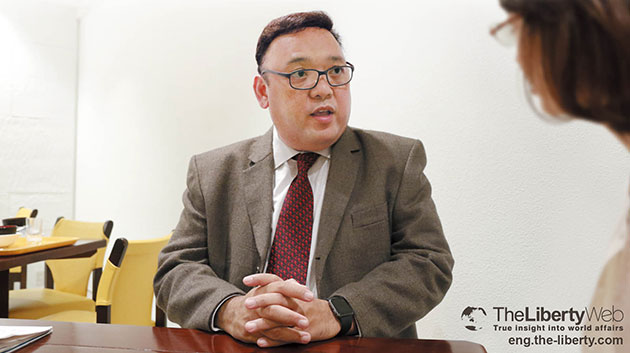An Insider’s View on The Philippines’ Foreign Policy: An Interview With Harry Roque
- The Philippines wants Japan to become independent of the US and help the Philippines.
- The US will not help the Philippines; the Philippines needs Japan to help them.
Harry Roque
Advisor to the President of the Philippines
Member of the 17th Congress of the Philippines and specialist in the Law of the Sea
Born in 1956, he graduated from the University of Michigan majoring in Economics and Political Science, and later graduated with a law degree from the University of the Philippines. He attained a doctorate at the London School of Economics, and became a lawyer specializing in Law of the Sea. He accompanied President Duterte during his visits to Japan and China. He was in charge of the lawsuit against China in the Permanent Court of Arbitration regarding the South China Sea, and currently serves as a member of the Congress of the Philippines.
How are we to respond to President Duterte’s extreme measures?
With this important question in mind, we interviewed Harry Roque, Filipino Congressman and advisor to Duterte, about the president’s true intentions.
Interviewer (I): Duterte’s words are known to be unpredictable, like how he criticizes the U.S. their allies, and appears supportive of China. What are your thoughts on this?
Roque (R): If we look with a long-term view, the president is quite consistent in what he says and does. He is thinking of putting more energy into eradicating illegal drugs through an independent foreign policy. For instance, cutting dependence on the U.S. and drawing out support from China.
(I): It looks as if Mr. Duterte is trying to change the order in Asia by himself alone.
(R): In the past, the U.S. maintained a solid union with Asian countries to establish an anti-China encirclement countermeasure, but not any more. This is why Mr. Duterte is showing the world that even the Philippines alone can become China’s equal. I think Malaysia will be the next country to make contact with China.
(I): That’s true. Unlike with the Senkaku Islands, the U.S. hasn’t declared that the U.S.-Philippines mutual defense treaty is effective.
(R): If the U.S. gives us the same assurance that they gave Japan, we will be able to depend on the U.S. and president Duterte wouldn’t think about putting forward his foreign policy to China. But we have already lost two islands. When we were in trouble, the U.S. didn’t come to help us. They thought that the international law would resolve the issue and refused to take a stance in the territorial disputes.
(I): What is your opinion on the conclusion given by the Court of Arbitration that ‘China cannot be granted their alleged rights over the South China Sea’?
(R): It was the Philippine government, and not the U.S. that decided to approach the Court. I advised the government to consult the Court of Arbitration. Of course the Philippines were responsible for the attorney fees.
At this point, the U.S. had not thought about what they should do, and did not provide assistance in the Court voting. In going to the Court we gained the confidence that we can make negotiations with China by ourselves. If so, why do we need to rely on the U.S.?
(I): Where does president Duterte’s independent foreign policy stance stem from? Does this have something to do with the fact that the Philippines were under U.S. colonial rule for a long time?
(R): The Philippines were the only U.S. colony. The Philippine-American war has come down in history as one of its most violent and inhumane, and going against international humanitarian law. The U.S. has yet to acknowledge the great losses from the Philippine-American and to apologize to us. After U.S. conquest, Filipinos including those who emigrated to the U.S. were used for cheap labor. This is why Filipinos resent the U.S.
Currently, the U.S. economic growth rate is 2%. Comparing this to China’s 6%, it is clear that the U.S. is losing its influence as an economic powerhouse. Against the GDP, the U.S. fiscal deficit is 108%, while China is 100%. Again this shows why the Philippines are more interested in Asian countries.
President Duterte is looking into Asia, not just China, but also Japan. This is why the president visited Japan straight after China, and emphasized that the Philippines’ future lies with Asia and not the U.S. This is what his independent foreign policy is about. In the past, us Filipinos were treated like our national interests didn’t matter, just like Iraq.
(I): At Beijing, president Duterte announced separation from the U.S., and declared that he will turn out the U.S. army within 2 years. But considering how the Philippines are still somewhat relying on U.S. military and economics, how does he plan to put this separation into action? Is it really possible?
(R): I think it is possible. We abrogated the Enhanced Defense Cooperation Agreement, and I was one of the people who went to court to do so. The president’s declaration to turn out U.S. military personnel was made based on this.



















